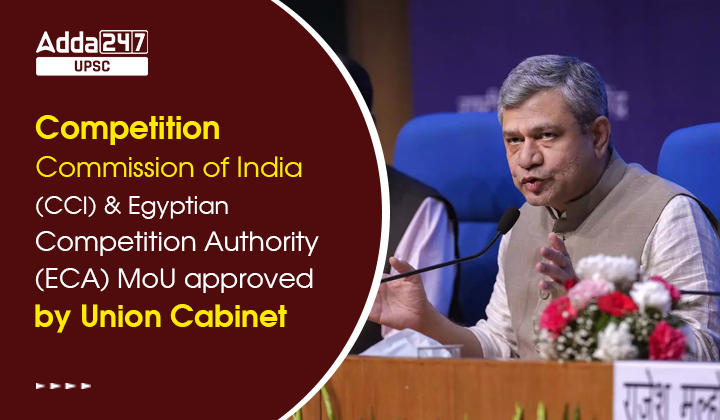Table of Contents
Competition Commission of India (CCI): It is an independent statutory body established under the Competition Act of 2002. It is responsible for promoting and sustaining competition in the Indian market by preventing anti-competitive practices, regulating mergers and acquisitions, and ensuring fair trade practices. Competition Commission of India (CCI) is also important for UPSC Prelims Exam and UPSC Mains Exam (GS Paper 2: Indian Constitution- statutory bodies established by Parliament)
Competition Commission of India (CCI) in News
The signing of a Memorandum of Understanding (MoU) between the Competition Commission of India (CCI) and the Egyptian Competition Authority (ECA) has been approved by the Union Cabinet, with Prime Minister Shri Narendra Modi presiding over the meeting.
- Section 18 of the Competition Act, 2002 empowers the Competition Commission of India (CCI) to establish memoranda or arrangements with foreign agencies to fulfill its duties and functions as outlined in the Act.
- In line with this provision, the current proposal pertains to the signing of a Memorandum of Understanding (MoU) between the CCI and the Egyptian Competition Authority (EGA).
MoU b/w CCI and Egyptian Competition Authority (ECA)
The approved MoU between the Competition Commission of India (CCI) and the Egyptian Competition Authority (ECA) envisions the promotion and enhancement of cooperation in the field of competition law and policy.
- This collaboration will involve the exchange of information, sharing of best practices, and the implementation of capacity building initiatives.
- Additionally, the MoU seeks to establish and strengthen ties between the CCI and ECA, facilitating mutual learning and the adoption of successful approaches to competition law enforcement in their respective jurisdictions.
- The agreement aims to foster experience sharing and technical cooperation for the benefit of both organizations.
Significance of MoU b/w CCI and ECA
By facilitating the exchange of enforcement initiatives, the MoU will enable the Competition Commission of India (CCI) to learn from the experiences and lessons of the Egyptian Competition Authority (ECA).
- This valuable knowledge transfer will contribute to the enhancement of enforcement practices under the Competition Act of 2002 by the CCI.
- As a result, consumers will be the ultimate beneficiaries, experiencing improved outcomes that promote fairness, inclusiveness, and equity in the marketplace.
Competition Commission of India (CCI)
- About: The Competition Commission of India (CCI) was established in March 2009 (established in 2003 but became fully functional in 2009) by the Government of India under the Competition Act, 2002 for the administration, implementation, and enforcement of the Act.
- It is a statutory and quasi-judicial body and works under the Ministry of Corporate Affairs.
- Competition Act, 2002: it repealed and replaced the Monopolies and Restrictive Trade Practices Act, 1969 (MRTP Act).
- Under the Act, the Competition Commission of India and the Competition Appellate Tribunal (COMAT) have been established.
- The Act prohibits anti-competitive agreements, abuse of dominant position by enterprises, and regulates combinations (acquisition, acquiring of control, and Merger and acquisition), which causes or are likely to cause an appreciable adverse effect on competition within India.
- In 2017, functions of the COMAT were subsumed under National Company Law Appellate Tribunal (NCLAT).
- Composition: it has a chairperson and 6 Members appointed by the Central Government.
- These members are appointed for 5 years or 65 years of age (whichever comes first). However, these members are eligible for reappointment.
Objectives and functions of CCI
Key Objectives and Functions of the Competition Commission of India (CCI) are discussed below-
- To Eliminate practices having an adverse effect on competition
- To promote and sustain competition
- To protect the interests of consumers
- To ensure freedom of trade in the markets of India
- To Establish a robust competitive environment through:
- Proactive engagement with all stakeholders, including consumers, industry, government, and international jurisdictions.
- Being a knowledge-intensive organization with high competence level.
- Professionalism, transparency, resolve, and wisdom in enforcement.
The Editorial Analysis: COP27, in Egypt, must focus on food systems
G20 Foreign Ministers Meeting 2023 India, Venue, Date and Outcome
G20 Foreign Ministers Meeting 2023 India, Venue, Date and Outcome



 TSPSC Group 1 Question Paper 2024, Downl...
TSPSC Group 1 Question Paper 2024, Downl...
 TSPSC Group 1 Answer key 2024 Out, Downl...
TSPSC Group 1 Answer key 2024 Out, Downl...
 UPSC Prelims 2024 Question Paper, Downlo...
UPSC Prelims 2024 Question Paper, Downlo...
